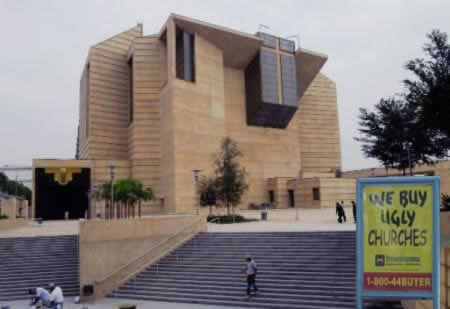I ran this test last year so you can check your progress




Funny how tomorrow this post will elicit no reaction.
Funny stuff at Fr. Dwight Longenecker’s blog.

The Crescat is running a set of pictures asking “can you tell difference…
… the winner will be the first one who can correctly identify the 12 structures below; is it a church or a prison/utilitarian structure?“

It’s not easy being me let me tell you. I went to a silent retreat. Turns out it was a regular retreat, just nobody wanted to talk to me. I can’t get no respect.
When I was a child I was possessed by a Demon. When my bed lifted up in the air my mother told the Demon to hold it up there while she got the dust mop. I didn’t even spew pea soup, more like Cambell’s Chicken Noodle. Turned out I was possessed by a very minor Demon who couldn’t even get his Latin declensions right and ran at the sight of Holy Water. No respect I tell you.
When I received Confirmation the Bishop slapped me. I asked him “I thought we didn’t do that anymore?” He told me in my case he made an exception.
My parents used to read me stories from the Desert Fathers every night. I thought this was great until I got a one way ticket to the Sahara on my birthday. I tell you it’s hard being me.
When I received the Precious Blood via the chalice they didn’t wipe it off afterward, they retired it. I just can’t get no respect.
I once went to a retreat house of a progressive order of nuns. They sent me to a prayer labyrinth. Took me 5 days to get out of there. No respect. Later they gave me directions to protest the missiles at the local military base, turns out it was during a live firing.
I went to confession and told the priest my typical laundry list of sins. He said “I have just heard the confession of a child – Damien from the Omen.” No respect and he have me 1500 Hail Marys to boot.
I finally got a spiritual director. He told me that I must follow his direction exactly and not question his advice. He asked me if I could do that. I said yes and he said “Good, then leave and never come back.” I tell you it is really hard being me.
I thought I might have a vocation to the priesthood. I met with 30 different vocations director and they all said I had a vocation to be a hermit. No respect, though one of them was nice enough to give me directions to a local cave.
After that I considered that I wanted to be a Cistercian monk and follow in the footsteps of Thomas Merton. The Cistercian novice master sent me to a hotel room in Thailand and told me to plug in the fan. I offer it up I tell you, but it ain’t easy being me.
So maybe I was called to the married life. I signed up with an online Catholic dating service. I filled out the profile honestly. The next day I got an email on details on becoming a consecrated virgin. Well Jesus got no respect either, so who am I to complain?
I went on pilgrimage to Lourdes. After waiting in line all day they told me to come back when the lines died down. Well Mary told St. Bernadette she wouldn’t be happy in this life, I just hope I can get some respect in the next one.
I have a devotion to St. Therese the Little Flower. I was praying to her to intercede for me and I asked for a sign. Sure enough next day somebody gave me some Rose stems.
You think you have it hard? Well try to be me. I went to a Protestant Bible study. They told me to come back later. I asked when, they said when they get to Maccabees. No respect even from my separated brethren.
It ain’t easy being me and I thank God for the Psalms so that I can commiserate with that King David guy. Jonah had plenty of off days also. Now can someone point me to a parish where they don’t make me sit in the cry room?
The Raving Theist has more on his conversion. This proves that while us followers of brainwashing cults have to leave our brains behind, at least we get to retain our funny bones.
His headline does remind me of this extremely hilarious John Cleese podcast video.
I found this list via Slashdot and here is a sample.
C would be Judaism – it’s old and restrictive, but most of the world is familiar with its laws and respects them. The catch is, you can’t convert into it – you’re either into it from the start, or you will think that it’s insanity. Also, when things go wrong, many people are willing to blame the problems of the world on it.
Java would be Fundamentalist Christianity – it’s theoretically based on C, but it voids so many of the old laws that it doesn’t feel like the original at all. Instead, it adds its own set of rigid rules, which its followers believe to be far superior to the original. Not only are they certain that it’s the best language in the world, but they’re willing to burn those who disagree at the stake.
PHP would be Cafeteria Christianity – Fights with Java for the web market. It draws a few concepts from C and Java, but only those that it really likes. Maybe it’s not as coherent as other languages, but at least it leaves you with much more freedom and ostensibly keeps the core idea of the whole thing. Also, the whole concept of "goto hell" was abandoned.
C++ would be Islam – It takes C and not only keeps all its laws, but adds a very complex new set of laws on top of it. It’s so versatile that it can be used to be the foundation of anything, from great atrocities to beautiful works of art. Its followers are convinced that it is the ultimate universal language, and may be angered by those who disagree. Also, if you insult it or its founder, you’ll probably be threatened with death by more radical followers.
C# would be Mormonism – At first glance, it’s the same as Java, but at a closer look you realize that it’s controlled by a single corporation (which many Java followers believe to be evil), and that many theological concepts are quite different. You suspect that it’d probably be nice, if only all the followers of Java wouldn’t discriminate so much against you for following it.
Perl would be Voodoo – An incomprehensible series of arcane incantations that involve the blood of goats and permanently corrupt your soul. Often used when your boss requires you to do an urgent task at 21:00 on Friday night.
Fairly funny list, though Perl was written by a Christian and taken from a biblical reference to the "Pearl of great price" so Voodoo isn’t quite fair.
Strangely though their was no language referenced for the Catholic Church. I guess it would be pretty hard to link the Church to one specific language. As someone who writes code for a living this question though is write up my alley. Besides the episcopal jurisdiction of the Bishop of Rome is the head of the Holy C.
At first thought I would think Pascal could be it since it is named after French mathematician and philosopher Blaise Pascal who was certainly a believing Catholic who wrote the great theological work the Pensées. Pacal has strong typing and I do like a dogmatically typed language where an object stays that type of object without explicit conversion. Begin and end keywords reminds me of the Alpha and Omega. Pascal just does not go far enough to resemble the Church.
Now a programming language that reflected the Catholic Church would be a cross between Basic and machine language. Basic gives it the James Joyce ‘here comes everybody’ aspect and machine language would give it the direct access to God that we have through the Eucharist. The Catholic Church can nourish anybody from the humblest peasant to the most brilliant theologian. Like most languages an interpreter is required for compiled code. In computing if you don’t have a valid interpreter/compiler the code you write will end up either doing nothing or not what you intended. The teaching magisterium of the Church gives us that interpreter in real life. A good interpreter/compiler also has lots of error checking. On our own we are often prone to errors and so being informed of our errors is to our good to ensure that we write valid code. Often we think we are writing valid code only to find that when we go to build it something is not exactly right. You can’t just tell the interpreter/compiler you are sorry for writing bad code, you have to repent of your coding error and fix it.
Now what would we call a programming language similar to the Catholic Church? How about C†† (pronounced C Cross Cross). Like St. Paul the Church teaches Christ crucified and the cross is never missing from our lives. The C of course stands for Catholic and the universal binary that the code produces. The universal binary is of course accessible by all operating systems. Though while we see the good that is common to many programming languages we hope that all will come to accept the fullness of C††. As programmers we don’t want to be triumphalists, but to help to spread the good code to every nation.
The basics of the language C†† would be fixed. Though interfaces can be later added on that help to access the underlying language. The code structures would be based both on apostolic programming tradition and the reference book. The compiler also known as the magisterium would rely on the CDF (Coding for the Doctrine of the Flow) to ensure wayward code was corrected and brought back into fullness of the code specification. When bad code is detected the compiler would throw an anathema.
C†† would certainly be strongly typed. An object created yesterday or even a thousand years ago would remain exactly the same object today. Though this does not mean that we can not understand an object more deeply over time, only that an integer value will not become a string just because it is currently fashionable in the culture for this to be true. What is set to a state of true today remains true tomorrow. For example this is how you would set a true and a false value in C††.
boolean item = dogma;
boolean item2 = heresy;
Other keywords include Fashion (which can hold any value, but is not used for anything serious), Absolute (which holds one constant value that never changes), Discipline (value can change over time based on a prudential decision), Hierarchy (An ordered data structure).
Multiple coding styles known as rites can be used to write the code. These rites though will all compile to exactly the same code whether using an Eastern or Western style. Some traditional programmers prefer to only program in Latin, but you can choose a vernacular language as long as you don’t use and edition approved by ICEL in the seventies which does not give the full nuances of the keywords.
The reference for C†† would be maintained by the Vaticode. The head programmer/maintainer at the Vaticode is called His Geekiness and he has final say on the language definition and its interpretation. The Vicar of Code is infallible only when speaking on code and compilers. The Nerds in union with His Geekiness are the authentic teachers of the language. New definitions can be added to the language that conform to the reference and apostolic programmers. Sometimes a movement among programmers (geekus fidelum) can lead to the Vaticode adding a new definition.
Here is a sample "Hello World" program in C††
faith()
{
works()
{
print(“Let there be light”);
}
}
After all "Let there be light" was the original Hello World program by the Divine Programmer. Every C†† requires a "faith" method which is the main entry point to the program. Remember faith() without works() and your code is dead.
If only there was a programming language like the Catholic Church. Right now there are so many denominations of programming languages that keep splitting. Like C+ going into schism from C and then C++ going into schism from C+. I pray that there be but one language.
When Baby Jesus disappeared last year from a Nativity scene on the lawn of the Wellington, Fla., community center, village officials didn’t follow a star to locate him.
A GPS device mounted inside the life-size ceramic figurine led sheriff’s deputies to a nearby apartment, where it was found face down on the carpet. An 18-year-old woman was arrested in the theft. [article]
In a parody I did two years ago.
|
I wrote this two years ago.
Today being the feast day of Saint Nicholas I was thinking about how cool it would be to go to the Mall dressed as this 4th century saint. To sit on the chair normally reserved for that cheap-imitator Santa (talk about identity theft), but to also take on some of his traditions. When children tell you what they want you could rebuke them for their materialism and to urge them to pray for the salvation of themselves and others and that they should work on a virtue that they lack. Remind that that while ole St. Nicholas doesn’t actually keep a list of those who are naughty and nice there is a Lamb’s Book of Life that they do want to get listed in. That if they do not obtain this they will get more than a lump of coal, but a eternal fire no doubt heated by more than just one lump of coal. Of course getting forcibly escorted out by Mall security as you left a trail of crying children might not be such a good idea.
Another thing is that the idea of a bishop promising gifts to children who sit on his lap must surely violate the Dallas norms and the Charter for the Protection of Children and Young People.
There is also the legend that the real Bishop Nicholas punched Arius at the council of Nicea. So to commemorate this feast why not make –
To decorate the punch bowl, make a wreath out of rosemary, mint, holly leaves and berries.
3-4 Seville oranges (smooth-skinned)
1-2 lemons, sliced
1 quart apple cider
½ cup raisins
1 teaspoon cloves
¼ cup sugar or brown sugar
1 teaspoon mace
1 teaspoon nutmeg
